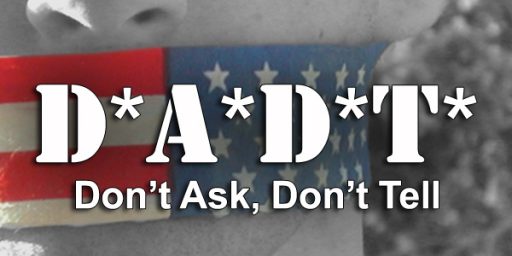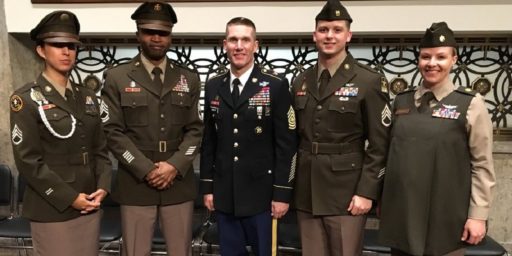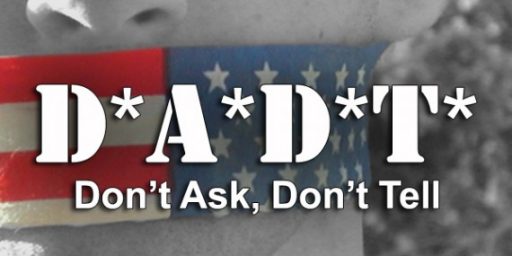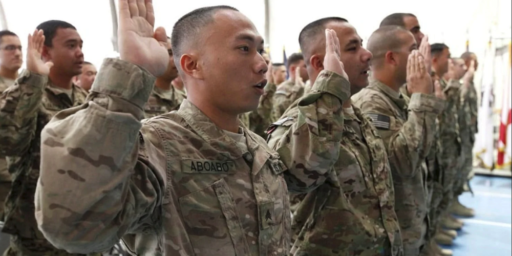Gay Medic Discharged after ’60 Minutes’ Appearance
A group “dedicated to ending discrimination against and harassment of military personnel affected by ‘Don’t Ask, Don’t Tell'” reports that Darren Manzella has been discharged under said policy.
Decorated Army Sergeant Darren Manzella has been discharged under the “Don’t Ask, Don’t Tell” law banning lesbian, gay and bisexual Americans from military service, effective June 10. The Iraq war veteran was one of the first openly gay active duty service members to speak with the media while serving inside a war zone. In December 2007, Manzella was profiled by the CBS news magazine 60 Minutes. He told correspondent Lesley Stahl that he served openly during much of his time in the Army, with the full support of his colleagues and command.
[…]
Sergeant Manzella said, “My sexual orientation certainly didn’t make a difference when I treated injuries and saved lives in the streets of Baghdad. It shouldn’t be a factor in allowing me to continue to serve.”
This is causing a stir in the blogosphere.
Steve Benen notes that Manzella was serving quite openly, “even introducing his Army buddies to his boyfriend.” His bosses knew, too, and didn’t care. But “now that Manzella’s revelations have become embarrassing to the Army, he’s been discharged.” Pam Spaulding goes further, claiming, “The Pentagon has decided that it was time to boot yet another decorated service member from its ranks not simply for being gay — but for exposing the fact that the boots and the ground and most COs don’t give a damn about someone’s sexual orientation.”
Well . . . not so much. By going on “60 Minutes” and drawing public attention to the fact that his commanders were breaking the law, of course they were backed into a corner.
Benen asks a reasonable question, though: “Which poses the great risk, Manzella being deployed and serving honorably, or Manzella not being deployed? Which is better for the troops? Which does more to help those in uniform? Which leaves the military stronger, and which leaves it weaker?”
The countervailing argument, which struck me as perfectly reasonable when DADT was passed in 1993, was that openly gay personnel, especially males in combat arms specialties, would disrupt unit morale. Having recently left the Army at that time and quite cognizant of its organizational culture, I had no doubt that this was the case. Recall, too, that DADT was actually criticized as a liberal social experiment on the part of the dope smoking (but not inhaling!) draft dodger Bill Clinton. Prior to DADT, soldiers were subject to being asked, for no apparent reason, whether they were gay. (Indeed, one of the more surreal experiences of my military career was going through the interrogation for my Top Secret/Sensitive Compartmentalized Information clearance and being asked a whole host of questions along the lines of whether I was gay, had ever been gay, or thought it conceivable that I might at some point in the future become gay.) DADT was designed to end the witch hunts.
That was fifteen years ago and society’s views on homosexuality have changed dramatically. The military is more socially conservative and slower to change its culture than the society as a whole but the vast majority of the enlisted soldiers and most of their officers have joined the Service since DADT was passed. As Amanda Terkel points out, such luminaries as JCS Chairman Mike Mullen and* former Senator Sam Nunn (a DADT sponsor) have indicated that the military might be ready for rethinking this policy. She even cites a recent Zogby poll [PDF] showing 73 percent of veterans of Iraq and Afghanistan being “comfortable with gays and lesbians.” Then again, only 26 percent in the same survey thought gays should be allowed to serve, compared to a plurality of 37 percent opposed.
It should be noted, too, that the number of people being discharged under DADT is less than half what it was during the last year of the Clinton administration. Still, 612 people (the number in 2006, the last year for which data are available) is a lot to lose during wartime when we’re struggling to meet recruiting and retention goals. One highly qualified medic who wants to stay in, whose unit members and leaders want him to stay in, is too many.
As to Manzella, personally, though, it’s not unreasonable to ask why the hell did he go on “60 Minutes” to talk about this if he wanted to remain in uniform?
__________
* UPDATE: Actually following the link, I see that Terkel merely links to her own account of Mullen’s remarks. What he actually said was that the military is following the law now and, if Congress changes it, they’d follow the new law. That’s hardly advocacy for changing the law.






The military has lots of regulations. Some make a lot of sense and some don’t. Try keeping your navy whites clean. The regulations say when you have to wear them and to keep them clean. Wouldn’t it make a lot more sense to just do navy blue all year? But those aren’t the regulations.
He joined well after the program was in place. Whatever the merits of the program, he was violating the regulation. Do you allow individual service people to decide what regulations they will follow and which ones they will decide don’t apply to them?
The policy decisions to allow or not allow something is a great debate to have. Just don’t expect sympathy when you violate the current policy.
Too funny! His army buddies don’t care? Yea right. Those macho he-men masculine GI’s don’t care about their fellow soldier being a fag? Give me a break!
It’s a good policy. Openly gay members of the military should be discharged. But if the liberals have their way (read: Obamessiah elected), the # of gay soldiers will dramatically increase, and hurt our nation’s fighting ability. Don’t believe it? Watch and see.
Rules are rules. You know this going in and you are aware of the consequences. The same thing with illegals crossing the border and being deported. They know what the deal is and what the consequences will be. No matter what you think is fair or unfair it is still the rules.
73 percent of veterans of Iraq and Afghanistan being “comfortable with gays and lesbians.†*** only 26 percent in the same survey thought gays should be allowed to serve, compared to a plurality of 37 percent opposed.
A bit like the polling on Obama — “It’s not ME who’s prejudiced against gays, it’s the other guys in my platoon.”
Heh. Yeah, definitely some of that.
The bottom line is that, unless the Army has changed radically since my day (which it may have) the culture equates courage and toughness with heterosexual masculinity.
Most major countries have allowed gays to serve in their military (UK and Israel, for example), with no problems regarding unit cohesion and the like. Strange how homophobic the US is. And, of course, homophobic men (unlike non-homophobic men) become aroused at view homoerotic scenes. (Study here.) Perhaps the strong strain of homophobia in the US is because so many homosexual men are fighting their true sexuality.
I think this is one of those rules that needs to go.
It may be uncomfortable for some people to serve with gays, but I figure they will eventually adjust.
Most concerns about inappropriate behavior can and should be dealt with through the UCMJ.
But if a gay person wants to serve their country I don’t think there is an overly compelling reason to tell them they can’t.
Leisureguy
Read the study you link too. It has a small sample group and the author admits there is another theory that could easily explain the experiment result. I suspect the results are a combination of many different causation including some who are repressing feelings. However that is just a guest on my part. I also am weary of putting to much faith in any single College study. They often turn out inaccurate or just plain wrong.
The military has enough to deal with. The rule will most likely change some day but it should be a military decision and not the civilian leadership decision.
As you’ve pointed out before, outside polls of military personnel are notoriously unreliable as the pollsters don’t have good access to a random sample. And if the poll is conducted by the military many soldiers put down what they think the military wants to hear.
I looked at the methodology in the PDF above.
I just don’t trust any statistics like this. Those that are willing to respond to an out-of-the-blue invitation to participate in a poll about a controversial political-military issue may not a be representative sample (or maybe folks opt-in on both sides of the question at equal rates, but I doubt it).
Perhaps with a larger sample the study wouldn’t hold—but perhaps it would. Who knows? I was just trying to figure out why so much homophobia in the US.
I do note that 20 of the 25 NATO nations allow gays in the military. It’s pretty common, it seems. Surely the US could do as well.
I’ve always enjoyed Bill Murray’s reply to the question in STRIPES, “No, but we’re willing to learn.”
Um, there’s a big difference between being gay and broadcasting it, at least IMHO. Give it another 10 years an no one will care.
Virtually the same excuses were rolled out when the army was integrated (loss of unit cohesion, etc). They turned out to false, as will the dire predictions about allowing openly gay men and women to serve.
This is always been the dumbest argument for me.
If soldiers are ordered to work with gay soldiers, they damn well better work with those soldiers. If they are ordered to wrestle naked with gay soldiers, the appropriate response is to ask ‘Greco-roman or traditional?’.
We’re talking about the US military, not a damn slumber party. Soldiers do not get to complain they are ‘uncomfortable’. If the US military had wanted soldiers to have an opinion on serving with gay soldiers, it would have issued them an opinion.
Just to support DavidTC: I think that the issue of “comfort” is rarely a priority in military life or military operations. I think if an enlisted man objected to some operation because of the discomfort he might encounter, he would be asking for a world of trouble. If you think about the fighting conditions in Iraq or Afghanistan today, you will not find comfort making an appearance.